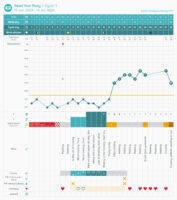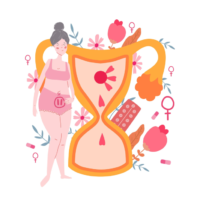REPRODUCTIVE HEALTH PLANNING – BEFORE 35
Michal Schonbrun, MPH, CHES,
It’s a fact. More and more women are delaying pregnancy and first birth until their late thirties’ and early forties. Most are educated, independent, invested in career goals and building financial stability. Some have potential partners; some have ambivalent partners and some have no partner. These women describe themselves as healthy, fit, and with regular menstrual cycles, so they assume there is nothing to worry about, until the body tells a different story. For many, there’s a huge disconnect between what they know about their biology and fertility clock in general, and how that clock applies to them personally.
For every young female under 35 who hopes one day of having children – this post is for you. You are not deciding today to get pregnant- but there is a lot you can do, learn and prepare for between now and then.

Picture from: Freepik
1. Follow your heart and desire. Start to imagine what a future family might look and feel like, even if the pieces are not yet in place. It is an ongoing meditation and process. Just because you don’t have a partner or ideal conditions for having a child – do not throw away the dream. Having a vision, a reproductive plan, a tentative timeline will help energize your intentions and feed your spirit. Open-up to the people in your life and express your intentions. Collect information. Build your social, family and financial networks so you’ll have support in place when you need it. You can revisit and adjust your plan. But start the process. If you need a “fertility” guide, there are fertility awareness educators (FAE’s) all over the world, like myself, that you can locate here. If you feel stuck, and need emotional support, there are therapists who specialize in parenthood clarity and even online courses.
2. Befriend and listen to your body. It’s the place you live that is “home” for the rest of your life. Become more knowledgeable and savvier about what and how your body communicates. Befriending your body means tuning in, making peace with who you are and cultivating self-acceptance and self-love. It means prioritizing your health and lifestyle. Be aware of how you gain and lose balance. Be aware of what connects and disconnects you from your body. What happens when you’re overworked, tired and sleep-deprived? What happens when eating habits spiral or when on-going stress depletes your energy and immune system? We are all sensitive to different things. Your early thirties are the years to establish good health and lifestyle habits and find ways to practice and maximize self-care.
3. Pay attention to your menstrual cycle. Your cycle is your number one ally when it comes to gauging your fertility and overall health. Your cycle is your body’s “5th vital sign,” as important as heart rate, body temperature, blood pressure and respiratory rate. How regular are your cycles? Do you ovulate? Have bad period pain or heavy bleeding? Did you know that regular ovulation is a sign of overall health and not just fertility potential?
If you are a long-time user of hormonal birth control (HBC), taken for regulating an irregular cycle or treating bad period pain or other issues- there’s a good chance that when you stop these methods, an underlying problem is going to resurface. Instead of attending to the symptoms of a deeper problem, you can often fix the problem with natural medicine ( naturopathy and nutrition, Chinese Medicine, functional medicine doctor). HBC creates “artificial” cycles that mask conditions like endometriosis (pain) or polycystic ovarian syndrome (PCOS-irregularity). Making lifestyle changes around diet, exercise, stress and sleep can go a long way to strengthen your health and fertility.
4. Become body-literate. Learn fertility awareness (FA) with a certified teacher. Charting your basal body temperature and natural secretion changes can give you vital information about your cycle and fertility. You can only get pregnant during a few days of your cycle and you can easily learn to identify these days. This is stuff your gynecologist hasn’t learned. This isn’t just knowledge, but power, control and peace of mind that comes with mastering your fertility, literally. Having a tool for gauging hormonal health is life-changing and will change your relationship to your body. FA can also help you conceive sooner rather than later.

From App: readyourbody
5. Investigate. If you don’t have regular cycles now or didn’t have them in the past- you may have a hormonal or nutritional imbalance. There are far too many invisible women out there who are “sub-fertile,” meaning they have an undiagnosed problem which is reversible and make it difficult to conceive, until they take care of the problem. Sub-fertility affects those with a history of overweight or underweight (low or high BMI), restrictive diets and eating disorders, chronic stress, over-exercise, iron deficient anemia, hypothyroidism, and low B12. While known to disrupt reproduction, few women (or their doctors) are aware that these lead to sub-fertility so please, connect the dots.
6. Remember: Age is the number one, preventable risk factor leading to infertility. Despite what you might think, “forty is not the new thirty”. Stop believing the stories you read in trendy magazines and on fertility clinic website ads that say “all is chill, you can take your time and wait, even until 40.” Just because some rich and famous celebs can have “hi-tech” babies in their late 40’s – doesn’t mean that you can too. This is a cynical and insidious lie that infertility doctors and clinics profit from because the longer you wait, the harder it becomes. These clinics are waiting to greet you with open arms… when you need hi-tech treatment.
7. Test. If you’re in your early 30’s, regardless of relationship status, the most proactive thing you can do is to learn about and check your fertility status or ovarian reserve (AMH, AFC, FSH). Our eggs are ageing from year to year, and when we pass our mid-30’s our fertility potential has already declined. By the time we reach 40, our reserve is seriously depleted. Again, it bears repeating- just because you have a “regular” cycle doesn’t mean you have good ovulation or that your egg quality will guarantee a healthy pregnancy and baby. Results from these tests provide a baseline for future comparison and how fast your biological clock is ticking. They can predict how many years of fertility you still have; how your fertility compares to women your age and if you will be a good candidate for reproductive technologies like IVF in the future.
Having said this, multiple studies have found no definitive link between AMH levels and the likelihood of pregnancy. There are cases of women with high AMH who are not able to conceive and women with low AMH who do. A recent article in the BMJ warns of corporate interests invested in fertility treatments who are using feminist language around control and empowerment to sell non-evidenced based health interventions like DIY AMH testing at home.
CBC (complete blood count) is another way to gauge your overall health, by checking your blood biochemistry. This simple test can often detect health issues which could impair your fertility.
8. Freeze. Collect information and consider freezing your eggs (or embryos with a partner or donor sperm). While this is not guaranteed “fertility insurance” to bank on for the future, it can give you pause in postponing a big decision. Just remember- your chances of conceiving with frozen eggs or embryos will be dependent on the age that you froze them (spoiler alert- best by or before 35), the number of eggs harvested (best to have 15-20), and the age at which you will carry a pregnancy. Even if you have good eggs in the freezer, once you hit 40, there are much lower rates of success and higher rates of complications including pregnancy loss, premature birth, genetic-chromosomal abnormalities and more. And the little-big fact that your doctor may forget to mention: there’s a lot we don’t know yet, statistically, about egg thawing success because the eggs that most women in the world have frozen- are still frozen.
While technology makes this “pause” possible, we need to acknowledge the downsides of egg-freezing (EF). Celebs and social media influencers are creating trends that are driving more and more young women to freeze their eggs. Some of these influencers are partnering with IVF clinics with targeted ads about the biological clock. Some are documenting the actual EF process to hundreds of thousands of their followers. This raises serious ethical questions about the necessity of EF and the ability to make informed choices about it. Furthermore, EF in those under 30 carries the risk of ovarian hyper-stimulation, which could be life-threatening.

Picture from: Freepik
9. Develop critical thinking about the panaceas of IVF, which is expensive, invasive, carries risks and side effects – and can yield disappointing outcomes. Yes, there are always outliers, but IVF statistics are not particularly promising for those over 35. IVF success (having a live birth) in women between 35 and 37 is approximately 32% per each egg retrieval cycle. Success for women aged 41-42- is less than 10%. If you’re under 35, the success rate approaches 50%.
10. Consider family history. Are there cases of infertility, miscarriage or problems conceiving? Talk to relatives on both sides. A history of blood clotting disorders, diabetes, endometriosis, uterine fibroids or poly-cystic ovarian syndrome (PCOS) can be hereditary. The earlier you know, the more time you gain to figure out your risk factors and how to manage them. And speaking of risk factors- if you have a history of STI/STD’s, autoimmune disease, or cancer, these conditions could interfere with the ability to conceive naturally, or delay the time to childbirth with assisted reproductive technology (ART).
11. The bottom line is this: We cannot afford to take our fertility for granted. It’s OK to delay but know the facts so you can act. Despite the cultural pressures around us, we have to face the dilemmas and meet our own needs. As strong and independent women, we have the autonomy and responsibility to ourselves to make the decisions that are right for us – on our own terms and at our own pace.
Age matters – even when we are healthy and with regular cycles. Awareness and knowledge about our biology and cycles have the potential to reduce infertility among people who choose to delay. Personal empowerment is about being proactive, taking responsibility and making informed decisions. When it comes to pregnancy, child birth and parenthood- having this knowledge and a personal vision to navigate the dream is not just awesome but critical. It is in your control. May every young person (under 35) manifest this power – sooner rather than later.
Henderson-Jack, Lisa. The Fifth Vital Sign, Fertility Friday Publishing, 2019
Weschler, Toni. Taking Charge of Your Fertility, 20th Anniversary Edition, Harper-Collins, 2015
Briden, Lara. Period Repair Manual, 2nd Edition, 2018
Romm, Aviva. Hormone Intelligence, HarperOne, 2021
How a parenthood therapist helps women navigate the big decision
Quick Links
CERTIFIED BY
Association of Fertility Awareness Practitioners
Contact Me
Join Our Newsletter